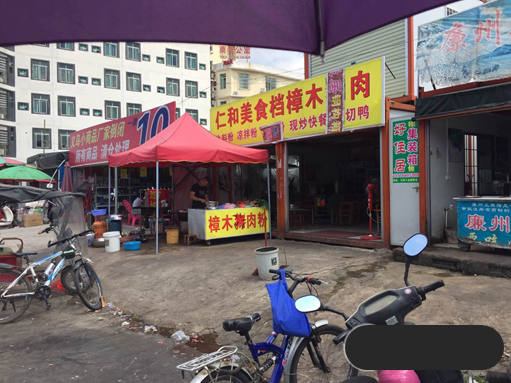导读:在中国南部省份广西壮族自治区的玉林市,餐馆纷纷遮住招牌上的 “狗”字,为的是在周二狗肉节开始之前“避免麻烦”

Restaurants in Yulin, South China’s Guangxi Zhuang Autonomous Region, covered the Chinese character "dog" on their signboards in order to "avoid trouble" ahead of the start of a controversial dog meat festival on Tuesday.
在中国南部省份广西壮族自治区的玉林市,餐馆纷纷遮住招牌上的 “狗”字,为的是在周二狗肉节开始之前“避免麻烦”。
Fearful of the protests from animal rights activists that have inundated past festivals, many restaurants and vendors in the city covered the Chinese character for "dog" on their signboards. Some restaurants even changed their names entirely. A dog meat seller surnamed Zhou who works at the city’s Dongkou market told the Global Times on Sunday that she just wanted to "avoid trouble."
在之前的狗肉节上,动物权益积极分子对此表示强烈的抗议。为了防止抗议的发起,玉林的很多餐馆和商贩将招牌上的“狗”字遮住,还有的甚至直接将招牌上的名字全部换掉。上周日,在玉林洞口市场卖狗肉的张女士告诉《环球时报》记者,这样做只是为了“避免麻烦”。
Another dog meat seller surnamed Li who works near Jiangbin Road told the Global Times that the government has required vendors to cover their signboards. "Recently, authorities have frequently asked to check the licenses of these restaurants and vendors, including their food sanitation permits and business licenses," Li said.
另外一位在江滨路附近卖狗肉李姓商贩告诉《环球时报》,政府已经要求商贩遮住他们的招牌。“最近,有关部门频繁检查这些餐馆和商贩的食品卫生许可证和营业执照等证件,”他说。
"They know it is something disgraceful, so they try to cover the name," Wang Xiaojun, senior communications manager at international animal rights group World Animal Protection, told the Global Times on Sunday.
“他们知道卖狗肉并不光彩,所以才遮住招牌,”世界动物保护协会高级公关经理王晓军上周日告诉《环球时报》。
On Jiangbin Road, dubbed "dog street" for the cluster of dog meat restaurants there, a line has formed as people wait for these restaurants to start hanging their dog meat and prepare for dinner at 6 pm.
玉林江滨路,因为有很多狗肉馆聚集在这里,被称为“狗肉一条街”。下午六点,很多店铺已经开始准备食材,把挂着狗肉的摊位推到街面上,有不少食客在那里排起长队。
Before mass media coverage of the festival - which has been held on the summer solstice since the 1990s - began in recent years, only local people bought dog meat around the solstice, whereas now many people from Northeast China or neighboring Guangdong Province also come here to taste the meat, a local citizen surnamed Zhang told the Global Times on Sunday.
当地市民张先生告诉环球时报记者, 20世纪90年代以来,狗肉节一直在夏至前后举行。以前只是当地人在夏至前后买些狗肉吃,这几年媒体对狗肉节的大肆报道使一些食客从东北或者邻省广东来到这里品尝狗肉。
Zhou, the dog meat seller, said that eating dog meat is a long-standing tradition that people from outside the area may not understand.
狗肉商贩周先生表示,吃狗肉在当地是一个悠久的传统,外地人也许很难理解。
Past festivals have witnessed confrontations on the street between restaurant owners, vendors and animal welfare protesters, who claim the festival is barbaric and who have called upon the city to stop the "cruel celebration" of dog meat, lychees.
前几年的狗肉节,餐馆老板、商贩与动物福利倡导人士之间争执不断。动物福利倡导人士认为狗肉节残忍野蛮,呼吁玉林停止庆祝荔枝狗肉节这种“残酷的庆祝活动”。
"The government is capable of telling the public that this kind of tradition is improper and should be banned," Jiang Hong, head of a Xi’an-based animal protection group, told the Global Times on Sunday.
“政府要告诉公众,这种传统活动是错误的,应该取缔,”西安动物保护协会主席姜红上周日告诉《环球时报》。
"The market stimulated the production chain. In order to get dogs, many people resorted to stealing and poisoning them, which may be dangerous, since some people were likely to have been poisoned by eating poisoned dogs," Jiang added.
“市场需求刺激生产链。为了得到狗,很多人会偷狗或对狗下毒。这种做法很危险,因为有些人会因为食用有毒的狗肉而中毒,”姜红补充道。
A supervisor of the Dongkou market surnamed Pang told the Global Times that all the dog meat sold in the market had been approved by the local food safety watchdog, adding that no law or regulation prohibits residents from buying or selling dog meat.
洞口市场的庞家督元告诉《环球时报》;市场上所有售卖的狗肉都经过了当地食品安全监督部门的审查,而且没有法律或规定禁止人们买卖狗肉。
According to a report by West China Metropolis Daily, some 10,000 dogs are consumed during every dog meat festival.
据《华西都市报》报道,狗肉节期间,每天会有上万条狗被杀。







